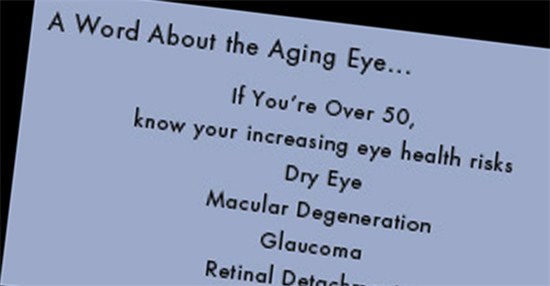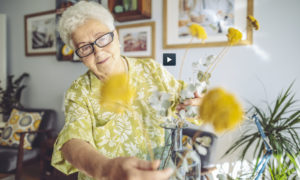By JeanMarie Davis, OD
SYNOPSIS
Addressing the eye health of senior citizens is a practice-builder that provides a needed service and offers profitable streams of revenue. To succeed, hone your skills and promote your services.
ACTION POINTS
HONE SKILLS byimproving communication of the diagnosis and treatment plans.
PROMOTE SERVICES by creating effective co-management and referral systems.
Eyecare needs only increase with age, with senior citizens more likely to experience conditions such as macular degeneration, glaucoma, retinal detachments, diabetic retinopathy and cataracts.
With Baby Boomers rapidly moving into their senior years, ODs who aren’t prepared to address the needs of this population will miss out on a prime practice- and revenue-building opportunity. When I was in practice in South Florida, my senior patients comprised a significant portion of my patient base. I estimate that approximately 55-60 percent were seniors. The experience of serving these patients gave me insights into how best to care for them while building a practice.
Reimbursement for medical management of these patients provides additional revenue you would not otherwise have. Many of these patients are seen more frequently than once a year.Frequency of visits for senior patients is based on the clinical status of the patient. For example, most glaucoma patients who are well controlled are seen no less than twice a year, and more frequently if needed. The same protocol applies to diabetic, hypertensive, macular degeneration and other chronic conditions.
Every follow-up provides additional revenue. Necessary testing and interpretation of results also provides additional revenue. What’s more, the frequent interaction between doctor and senior patient allows for a closer doctor/patient relationship, which leads to more referrals. Senior patients will refer their spouses and friends of similar age, as well as bring their families for routine care.
Approximately 80 percent of my senior patients were covered by Medicare and/or Medicaid. We would bill their medical insurance. Comprehensive examinations annually and follow-up examinations throughout the year as needed were provided and billed for. Additional testing was also billed for, including technical testing and interpretation. If the OD does not have needed equipment, such as an OCT, the patient can be referred out to have the testing done and the OD can still bill for the interpretation of the test when the patient returns for the follow-up. The exact code used in this situation depends on the insurance and level of complexity. Reimbursement can range from $25 – $110 for follow-up depending on insurance and if any interpretation is included. Photos can also be billed for.
HONE COMMUNICATION SKILLS
Senior patients are very interested in taking the time for a full conversation regarding their health. They want to understand what the status of their health is, risk factors and what they can do to prevent disease or prevent the progression of disease if they have already been diagnosed. Younger patients, on the other hand, typically want a quick confirmation that they are healthy.
Take Time to Explain Diagnoses
When explaining a serious diagnosis of any type to a senior it is key to slow down and not rush through a quick explanation. They need compassion and time to process the information you are providing. Particularly in cases such as macular degeneration, in which sight is threatened, these are very sensitive conversations that often have a significant emotional impact. It is important to care for the entire patient and provide the care and compassion they need when receiving a serious diagnosis. It is important to provide all the facts. Patients want to understand what is happening to them, why it is happening or the cause (if it is known), the prognosis and what all their options are. This is a tremendous amount of information, but it is important to respect their need for all this detail. You want to be factual and provide as much optimism and support as possible at the same time. I would also always offer them a referral to a specialist for a second opinion on treatment. Often they would decline, but feel much better knowing that you are willing and able to provide what is in their best interest.
This is no set script you can use when explaining diagnoses to seniors. For example, when diagnosing a patient with macular degeneration what I would say varies significantly depending of the stage and type of macular degeneration they have. The conversation would depend not only on their condition, but mostly on their reaction to and perception of the disease. I would proceed very slowly, stop to ask them if they have heard of the condition, and then try to understand their perception of how they will be impacted. It is important to reassure them as much as possible. I would very gently review the findings of their examination, including showing them photos of their retina. This communication requires a balance of respecting that the diagnosis is very serious for the patient–regardless of the prognosis–without unnecessarily scaring the patient yet providing them with the information they need.
Provide Written Instructions to Help Follow-Through on Treatment
Most seniors take their diagnosis seriously at the time of the diagnosis, particularly if they are having some form of vision loss. They ask a lot of questions and care has to be taken to double-check that they understand what they are being told. If seniors understand and remember what they are told, they usually attempt to be compliant with follow-up visits, testing and treatment. It is important to provide them with a clear explanation of their diagnosis and follow-up plan and the importance of following the plan to reduce the risk of more rapid progression of their disease. It is also important to provide them with written information and instructions and a good idea to speak with their caregivers and/or family members–with the patients consent–since many times elderly patients can forget some details. Editor’s Note: In today’s world, this is where you “push” information to senior patients via e-mail and also send them to your web site.
PROMOTE SERVICES
Since hearing loss is very common in elderly patients, it’s all the more reason to provide written instructions to patients. It’s also a reason to have a relationship with nearby audiologists and hearing aid suppliers so you can create effective co-management systems. Many clinics and vision centers have hearing testing facilities close by. For independent practices, offering basic hearing screenings may be helpful, but this testing should be handled by a licensed professional. State regulations should be reviewed regarding having both vision and hearing testing on the same premises, and insurance companies should be consulted to understand the billing regulations, as well.
Medical management of seniors also results in referrals by PCP’s, endocrinologists, etc. It is advisable to always provide a report after each exam/follow-up to the patients PCP and/or specialist that is treating them for a systemic condition such as diabetes. It is important to do this whether the PCP referred them to you or not. This will provide important information to the physician to better help manage the patient and can also help to establish a relationship with those physicians. This often generates referrals from those doctors for all their diabetic, hypertensive, etc., patients. Some PCPs will even begin to refer for routine eye examinations.
When I was in practice I would often see referrals come in from these doctors simply because I had provided them a report on some of their patients. I recommend making a phone call to the PCP to introduce yourself, explain the status of the patient and let the PCP know that you are happy to provide any additional information they need.
Serve Senior Patients: Best Practices
Proper staff and staff training is necessary to help the elderly with instructions and mobility.
Have patience and provide written information on their condition and detailed instructions for proper compliance.
Very close follow-up is needed to ensure understanding and proper compliance.
Related ROB Articles
Develop People Skills to Serve Growing Number of Seniors
Meet the Growing Challenge: Treating Macular Degeneration
Improve Your Diagnosis Communication
 JeanMarie Davis, OD, is global head, technical, Global Performance Development for Alcon. To contact her: drdavis2020@yahoo.com.
JeanMarie Davis, OD, is global head, technical, Global Performance Development for Alcon. To contact her: drdavis2020@yahoo.com.



























